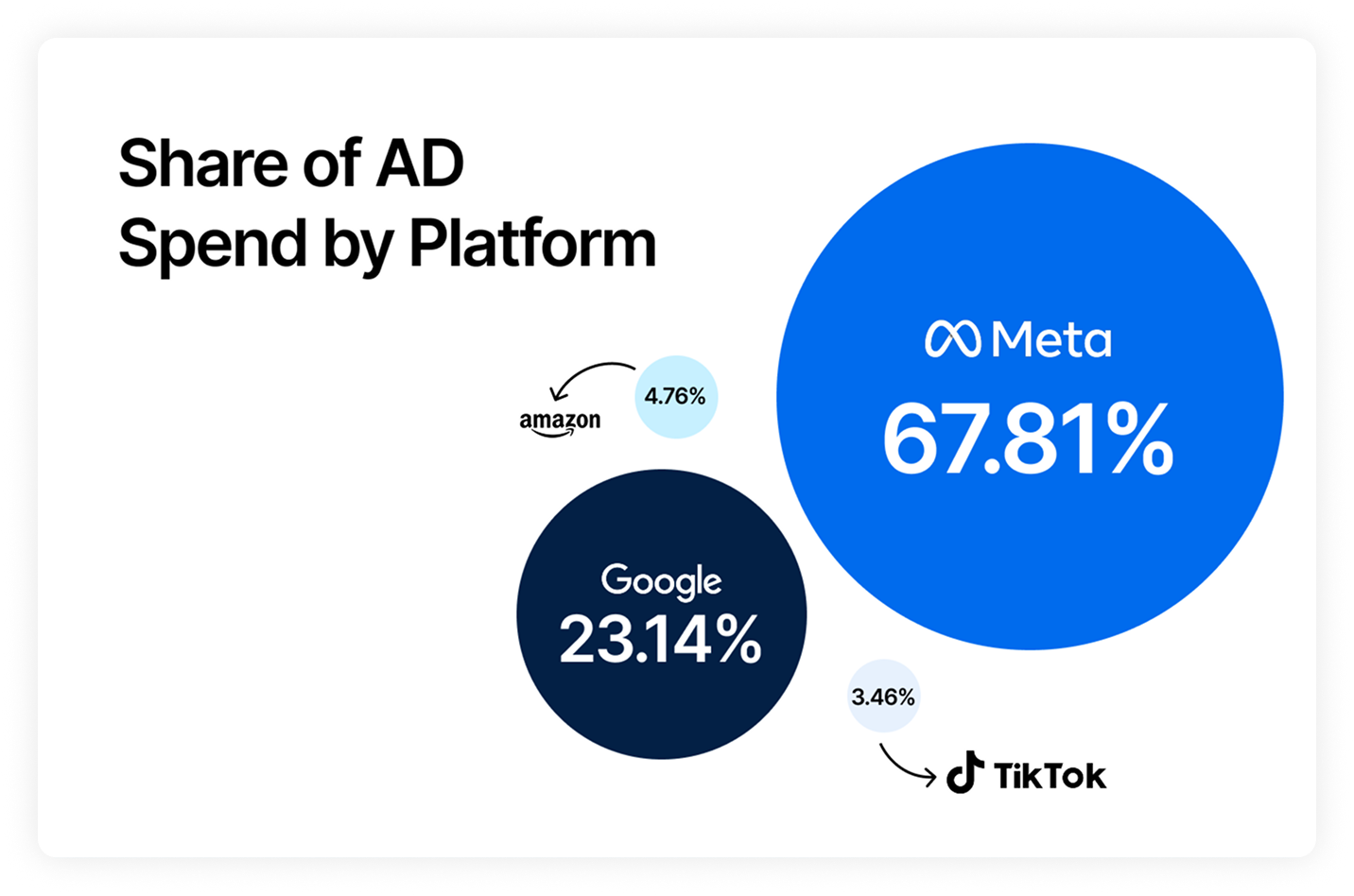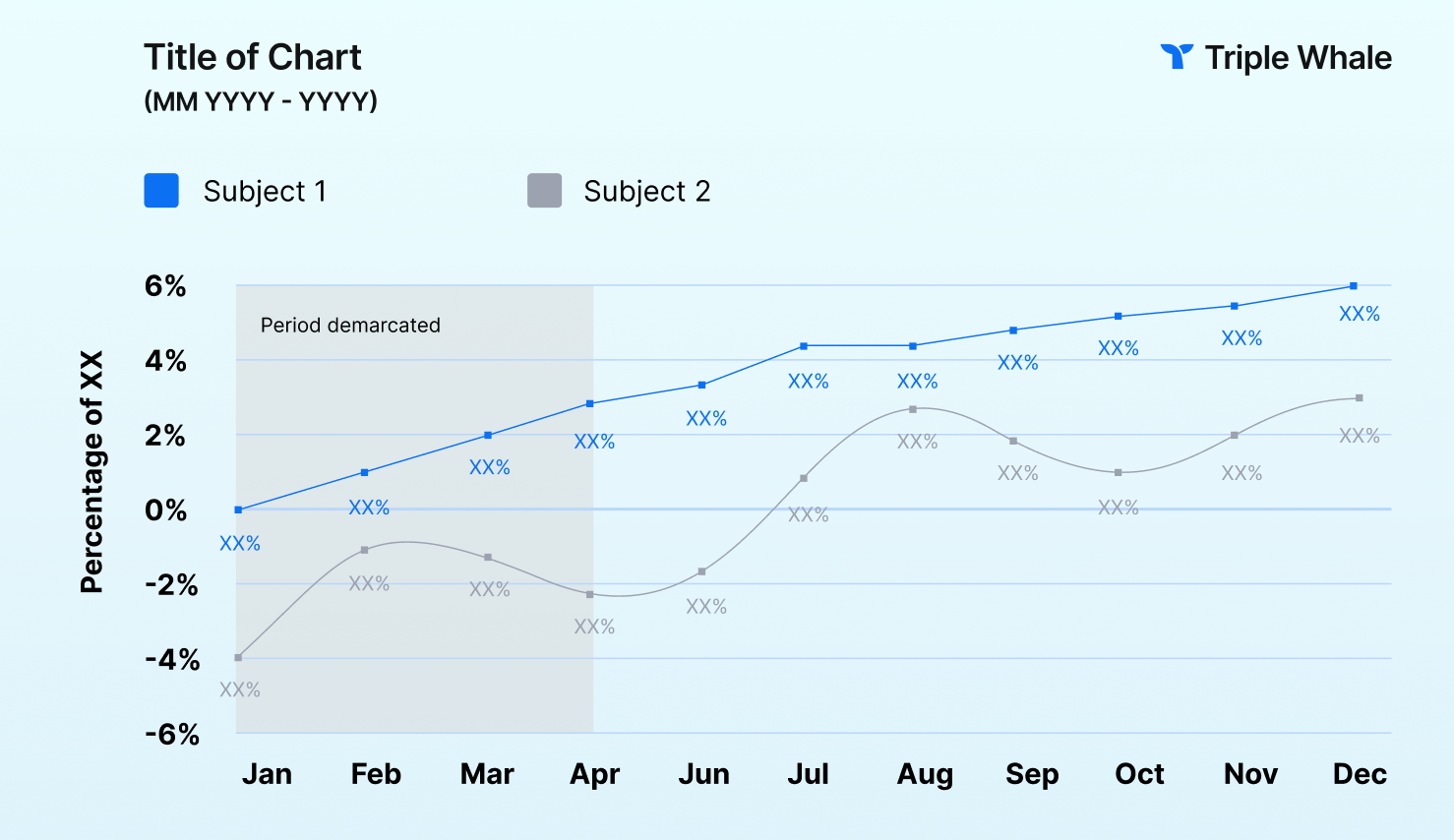
From uploading products and tracking inventory to optimizing your website for search and providing personalized customer support – the list of tasks required to successfully run an ecommerce store is ever-expanding. An ecommerce brand owner is constantly juggling information, tools, and making marketing decisions that can change the trajectory of their revenue, and there’s a need to consolidate data to better manage it all effectively.
With the rise of AI for ecommerce, tools have been developed to automate many of the above processes, so that brand owners can focus on more strategic tasks to run the company. AI tools for customer service have been widely used in recent years, and there continues to be growth in AI ecommerce personalization tools, AI shopping assistants, and AI ecommerce website builders. Software companies continue to expand the marketing automation software market, estimated at $8.05 billion in 2025, and expected to reach $18.06 billion by 2030, ccording to Mordor Intelligence.
Marketers are quickly adopting AI tools to run their brands, and with good reason: Ecommerce businesses that leverage AI can increase their profitability by up to 25%, according to McKinsey.
The trends in ecommerce are leaning heavily towards utilizing AI influencers, and even agentic AI to maximize their reach and profit. By removing tedious activities from human plates, automated tools can significantly impact an ecommerce brand’s output.
In this article, we’ll review the best AI tools for ecommerce in 2025 across eight categories:
We'll also provide tips for choosing the best AI tool for your business.

Jasper AI generates high-quality product descriptions, blog posts, and ad copy, making content creation fast and scalable.
Surfer SEO optimizes content for search engines by analyzing top-performing pages and providing actionable insights.
Synthesia allows ecommerce businesses to create professional AI-generated videos. They can use realistic avatars and voiceovers, which are perfect for product demos, tutorials, and personalized marketing messages.

Tidio combines live chat with the best AI chatbot for ecommerce to improve customer engagement and resolve queries instantly. Tidio can also provide an AI shopping assistant for your customers to recommend products, answer questions, book appointments, or track orders.
Boost.AI offers conversational AI solutions for ecommerce designed to automate customer service at scale, improving response times and reducing operational costs.
Intercom combines AI-powered chatbots, live chat, and customer messaging platforms to deliver personalized, scalable customer service experiences for ecommerce businesses.

Nosto uses AI to analyze customer behavior and recommend relevant products, boosting conversion rates and customer satisfaction.
Plerdy uses AI to analyze user behavior and provide personalized content recommendations to increase conversions.
Adobe Sensei uses AI and machine learning to deliver personalized customer experiences by analyzing vast amounts of data across customer touchpoints.

Triple Whale offers comprehensive AI-powered analytics and marketing automation tailored for ecommerce brands, enabling better decision-making through real-time data insights.
Klaviyo automates personalized email marketing campaigns using customer data to drive engagement and conversions.
Salesforce Einstein integrates AI capabilities directly into the Salesforce ecosystem, offering predictive analytics, personalized recommendations, and automated workflows tailored for ecommerce businesses.

Inventory Planner helps ecommerce businesses optimize stock levels by predicting future demand based on historical sales data.
Lokad offers advanced forecasting solutions for supply chain optimization using quantitative techniques, and focuses on delivering actionable insights.
Akkio offers advanced AI-driven forecasting and inventory management solutions, helping ecommerce businesses make faster, data-driven decisions.

MarketMuse uses AI to streamline content creation strategies, identifying content gaps and optimizing for search engine rankings.
Zoho Analytics provides comprehensive business intelligence solutions, offering powerful visualizations and AI-powered data insights that help ecommerce businesses make informed decisions.
Tableau offers advanced data visualization and analytics tools, enabling ecommerce businesses to gain deeper insights into customer behavior, sales trends, and operational performance.

Prisync helps ecommerce businesses monitor competitor pricing and adjust their own pricing strategies accordingly. It supports dynamic pricing automation, ensuring that businesses remain competitive in real time.
Pricen.ai offers automated dynamic pricing solutions based on competitor pricing and market conditions. It uses AI to recommend optimal pricing strategies that maximize revenue and profit margins.
Competera provides AI-driven price optimization for large ecommerce operations. It utilizes deep learning to balance pricing strategies, revenue growth, and customer retention.

Signifyd provides AI-powered fraud prevention tools that help ecommerce businesses detect and prevent fraudulent transactions in real-time, reducing chargeback and financial losses.
Kount provides AI-driven fraud prevention tools for ecommerce businesses, leveraging machine learning to detect and mitigate fraudulent activity across transactions.
Riskified provides AI-driven fraud detection and chargeback protection, helping ecommerce businesses maximize approval rates while minimizing fraudulent losses.
Choosing the right tool for your ecommerce business requires you to evaluate your needs, budget, and scalability of the tools, along with some other factors.
Here are a few things to consider when choosing your AI tools:
Since AI tools vary in cost, and you may need more than one to address your specific pain points, choose the ones that fit your current budget and needs.
The future of ecommerce is already here, with a plethora of AI tools to make building and scaling an AI brand easier. Businesses can enhance customer experiences, plan inventory, and have access to instant analytics with AI tools that are designed to streamline performance.
As AI continues to evolve, the number of AI tools will grow, too – it’s important that a brand does the necessary research to ensure they’re choosing the right tool that can scale and grow with their business. We hope this list of 24 of the best and most trusted AI tools will help you select the right tools for your business’s needs.
AI-driven insights and automation solutions are available in Triple Whale, the only ecommerce data platform designed to provide business intelligence, powerful AI-automated insights, and reliable attribution data all in one place. Book a demo today to see what it’s all about!

From uploading products and tracking inventory to optimizing your website for search and providing personalized customer support – the list of tasks required to successfully run an ecommerce store is ever-expanding. An ecommerce brand owner is constantly juggling information, tools, and making marketing decisions that can change the trajectory of their revenue, and there’s a need to consolidate data to better manage it all effectively.
With the rise of AI for ecommerce, tools have been developed to automate many of the above processes, so that brand owners can focus on more strategic tasks to run the company. AI tools for customer service have been widely used in recent years, and there continues to be growth in AI ecommerce personalization tools, AI shopping assistants, and AI ecommerce website builders. Software companies continue to expand the marketing automation software market, estimated at $8.05 billion in 2025, and expected to reach $18.06 billion by 2030, ccording to Mordor Intelligence.
Marketers are quickly adopting AI tools to run their brands, and with good reason: Ecommerce businesses that leverage AI can increase their profitability by up to 25%, according to McKinsey.
The trends in ecommerce are leaning heavily towards utilizing AI influencers, and even agentic AI to maximize their reach and profit. By removing tedious activities from human plates, automated tools can significantly impact an ecommerce brand’s output.
In this article, we’ll review the best AI tools for ecommerce in 2025 across eight categories:
We'll also provide tips for choosing the best AI tool for your business.

Jasper AI generates high-quality product descriptions, blog posts, and ad copy, making content creation fast and scalable.
Surfer SEO optimizes content for search engines by analyzing top-performing pages and providing actionable insights.
Synthesia allows ecommerce businesses to create professional AI-generated videos. They can use realistic avatars and voiceovers, which are perfect for product demos, tutorials, and personalized marketing messages.

Tidio combines live chat with the best AI chatbot for ecommerce to improve customer engagement and resolve queries instantly. Tidio can also provide an AI shopping assistant for your customers to recommend products, answer questions, book appointments, or track orders.
Boost.AI offers conversational AI solutions for ecommerce designed to automate customer service at scale, improving response times and reducing operational costs.
Intercom combines AI-powered chatbots, live chat, and customer messaging platforms to deliver personalized, scalable customer service experiences for ecommerce businesses.

Nosto uses AI to analyze customer behavior and recommend relevant products, boosting conversion rates and customer satisfaction.
Plerdy uses AI to analyze user behavior and provide personalized content recommendations to increase conversions.
Adobe Sensei uses AI and machine learning to deliver personalized customer experiences by analyzing vast amounts of data across customer touchpoints.

Triple Whale offers comprehensive AI-powered analytics and marketing automation tailored for ecommerce brands, enabling better decision-making through real-time data insights.
Klaviyo automates personalized email marketing campaigns using customer data to drive engagement and conversions.
Salesforce Einstein integrates AI capabilities directly into the Salesforce ecosystem, offering predictive analytics, personalized recommendations, and automated workflows tailored for ecommerce businesses.

Inventory Planner helps ecommerce businesses optimize stock levels by predicting future demand based on historical sales data.
Lokad offers advanced forecasting solutions for supply chain optimization using quantitative techniques, and focuses on delivering actionable insights.
Akkio offers advanced AI-driven forecasting and inventory management solutions, helping ecommerce businesses make faster, data-driven decisions.

MarketMuse uses AI to streamline content creation strategies, identifying content gaps and optimizing for search engine rankings.
Zoho Analytics provides comprehensive business intelligence solutions, offering powerful visualizations and AI-powered data insights that help ecommerce businesses make informed decisions.
Tableau offers advanced data visualization and analytics tools, enabling ecommerce businesses to gain deeper insights into customer behavior, sales trends, and operational performance.

Prisync helps ecommerce businesses monitor competitor pricing and adjust their own pricing strategies accordingly. It supports dynamic pricing automation, ensuring that businesses remain competitive in real time.
Pricen.ai offers automated dynamic pricing solutions based on competitor pricing and market conditions. It uses AI to recommend optimal pricing strategies that maximize revenue and profit margins.
Competera provides AI-driven price optimization for large ecommerce operations. It utilizes deep learning to balance pricing strategies, revenue growth, and customer retention.

Signifyd provides AI-powered fraud prevention tools that help ecommerce businesses detect and prevent fraudulent transactions in real-time, reducing chargeback and financial losses.
Kount provides AI-driven fraud prevention tools for ecommerce businesses, leveraging machine learning to detect and mitigate fraudulent activity across transactions.
Riskified provides AI-driven fraud detection and chargeback protection, helping ecommerce businesses maximize approval rates while minimizing fraudulent losses.
Choosing the right tool for your ecommerce business requires you to evaluate your needs, budget, and scalability of the tools, along with some other factors.
Here are a few things to consider when choosing your AI tools:
Since AI tools vary in cost, and you may need more than one to address your specific pain points, choose the ones that fit your current budget and needs.
The future of ecommerce is already here, with a plethora of AI tools to make building and scaling an AI brand easier. Businesses can enhance customer experiences, plan inventory, and have access to instant analytics with AI tools that are designed to streamline performance.
As AI continues to evolve, the number of AI tools will grow, too – it’s important that a brand does the necessary research to ensure they’re choosing the right tool that can scale and grow with their business. We hope this list of 24 of the best and most trusted AI tools will help you select the right tools for your business’s needs.
AI-driven insights and automation solutions are available in Triple Whale, the only ecommerce data platform designed to provide business intelligence, powerful AI-automated insights, and reliable attribution data all in one place. Book a demo today to see what it’s all about!

Body Copy: The following benchmarks compare advertising metrics from April 1-17 to the previous period. Considering President Trump first unveiled his tariffs on April 2, the timing corresponds with potential changes in advertising behavior among ecommerce brands (though it isn’t necessarily correlated).
